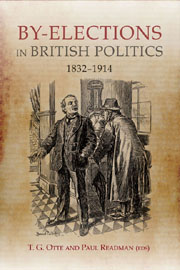Book contents
- Frontmatter
- Contents
- List of Figures and Tables
- List of Contributors
- Preface and Acknowledgements
- List of Abbreviations
- Introduction
- 1 ‘Plumping Contests’: The Impact of By-elections on English Voting Behaviour, 1790–1868
- 2 Government Appointment By-elections: 1832–86
- 3 ‘We should have had 1,000’: The By-elections of the 1874 Parliament
- 4 ‘The Glamour of Independence’: By-elections and Radicalism during the Liberal Meridian, 1869–83
- 5 ‘The Swing of the Pendulum at Home’: By-elections and Foreign Policy, 1865–1914
- 6 By-elections and the Modernisation of Party Organisation, 1867–1914
- 7 ‘A Terrific Outburst of Political Meteorology’: By-elections and the Unionist Electoral Ascendancy in Late-Victorian England
- 8 Land Reform and By-elections, 1885–1914: Do By-elections Matter?
- 9 Edwardian By-elections
- 10 Lloyd George, Limehouse and the Realignment of British Politics: The Bermondsey By-election of 1909
- 11 By-elections and the Peculiarities of Scottish Politics, 1832–1900
- Index of By-election Contests
- General Index
10 - Lloyd George, Limehouse and the Realignment of British Politics: The Bermondsey By-election of 1909
Published online by Cambridge University Press: 05 May 2013
- Frontmatter
- Contents
- List of Figures and Tables
- List of Contributors
- Preface and Acknowledgements
- List of Abbreviations
- Introduction
- 1 ‘Plumping Contests’: The Impact of By-elections on English Voting Behaviour, 1790–1868
- 2 Government Appointment By-elections: 1832–86
- 3 ‘We should have had 1,000’: The By-elections of the 1874 Parliament
- 4 ‘The Glamour of Independence’: By-elections and Radicalism during the Liberal Meridian, 1869–83
- 5 ‘The Swing of the Pendulum at Home’: By-elections and Foreign Policy, 1865–1914
- 6 By-elections and the Modernisation of Party Organisation, 1867–1914
- 7 ‘A Terrific Outburst of Political Meteorology’: By-elections and the Unionist Electoral Ascendancy in Late-Victorian England
- 8 Land Reform and By-elections, 1885–1914: Do By-elections Matter?
- 9 Edwardian By-elections
- 10 Lloyd George, Limehouse and the Realignment of British Politics: The Bermondsey By-election of 1909
- 11 By-elections and the Peculiarities of Scottish Politics, 1832–1900
- Index of By-election Contests
- General Index
Summary
On 18 October 1909 The Scotsman published a story on the upcoming Bermondsey by-election which began:
The slang of politicians describes each by election with monotonous regularity as an event of peculiar importance in the history of the country, or as marking an epoch in the fortunes of the party. The language which is used by way of commonplace on such occasions may be accepted with all seriousness in application to the pending contest in Bermondsey. Seldom indeed have the electors of any constituency held so obviously the fate of a party and a policy in their hands.
On the surface there seems little reason why the author should have singled out the Bermondsey vote for such special consideration. Indeed in many ways the Bermondsey by-election of 1909 seems a relatively unimportant affair. It brought to office one of the shortest-tenured MPs in modern British history. Elected in late October 1909, the Conservative candidate, John Dumphreys, only entered the House of Commons in November and held the seat for a few weeks before the dissolution of parliament before the general election of January 1910, at which he was defeated. Indeed, none of the candidates can be described as figures of very significant historical note. Dumphreys does not merit an entry in the Oxford Dictionary of National Biography. The Liberal candidate who came second, Spencer Leigh Hughes, did eventually get elected to the House of Commons from another seat in 1910, but remained an obscure backbencher. Only the third-place candidate, Dr Alfred Salter of the Labour party, ever achieved some prominence, though that happened decades later.
- Type
- Chapter
- Information
- By-Elections in British Politics, 1832-1914 , pp. 251 - 272Publisher: Boydell & BrewerPrint publication year: 2013

